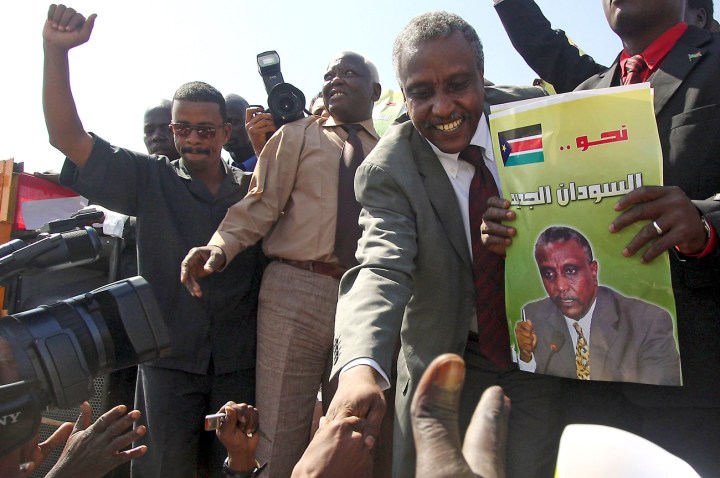Africa
01 April: SPLM presidential candidate withdraws from Sudan’s election

Also today: Nigerian Senate confirms new ministers; Europeans say foreigners must respect African rights in agricultural deals; ICC to investigate Kenya’s post-election violence; Sharia court bans Twitter, Facebook debates on amputations.
SPLM presidential candidate withdraws from Sudan’s election
Sudan
Sudan’s main opposition, the Sudan People’s Liberation Movement says its presidential candidate in the country’s election later this month, Yassir Arman, is out of the running because of continued conflict in the Darfur region and alleged electoral irregularities. The SPLM has a number of candidates vying for position in Sudan’s first multiparty elections in 24 years, but the latest news portends trouble following a 2005 peace deal that ended a 22-year civil war between the mainly Arab north of the country and the largely black African south. SPLM leader Salva Kiir had earlier said he was against boycotting the poll, despite believing some vote-rigging would take place. Various northern opposition parties have already said they would boycott the election amid allegations of widespread fraud.
Photo: Sudan People’s Liberation Movement (SPLM) presidential candidate Yasir Arman (R) shakes hands with supporters after arriving at Khartoum airport January 21, 2010. REUTERS/Mohamed Nureldin Abdallah
Read more: Bloomberg, Agence France-Presse, Al Jazeera, BBC
Nigerian Senate confirms new ministers
Nigeria
Nigeria’s senate has confirmed 38 new ministers nominated by acting President Goodluck Jonathan, after he dissolved the cabinet in the face of a power vacuum in the country of 140 million people. The new appointees include the country’s former junior oil minister and a former Goldman Sachs executive. The senate’s approval will enable Jonathan to quickly form a new cabinet, after President Umaru Yar’Adua fell ill with heart problems, fuelling political uncertainty in the oil-rich nation. In the more than three-month absence of Yar’Adua, Nigeria has witnessed deadly religious riots, a sporadic resumption of rebel attacks on oil installations and rallies by citizens calling for visible government. Jonathan recently sacked the cabinet in a bid to assert his authority after controversially assuming executive powers. The nominees confirmed so far include 13 members of the previous cabinet.
Read more: Xinhua, Reuters, Agence France-Presse
Europeans say foreigners must respect African rights in agricultural deals
EU-Africa
The EU says foreign investors in agricultural land in Africa must respect local human rights, livelihoods and resources, after major food importing nations such as Saudi Arabia, China and South Korea leased farmland abroad to secure food security. Reuters says critics of such moves claim the land deals are often not transparent and can compromise the livelihoods of local farmers. Now, an EU policy paper says its member states should support the development of internationally agreed principles for investments in agricultural land, and combat food security problems in developing countries. Global food prices have risen sharply since 2008, prompting countries such as Tanzania, Sudan, Mozambique and Madagascar to lease or consider leasing agricultural land to foreigners.
Read more: Reuters, African Agriculture, Guardian, Grain
ICC to investigate Kenya’s post-election violence
Kenya
The International Criminal Court in The Hague will formally investigate ethnic and social violence after Kenya’s 2007 election, which killed about 1,300 people and displaced tens of thousands of others. ICC chief prosecutor Luis Moreno-Ocampo suspects that crimes against humanity may have been committed, aided and abetted by Kenya’s politicians and security services. The ICC is frustrated that a subsequent unity government formed by fractious Kenyan political parties hasn’t yet investigated the violence, despite international aid groups and Western governments urging Kenya to introduce electoral reforms, eradicate corruption and punish those responsible for the killings.
Read more: UN News Centre, EU Business, BBC
Sharia court bans Twitter, Facebook debates on amputations
Nigeria
An Islamic court in northern Nigeria has permanently banned a rights group from using Facebook and Twitter to debate amputation as a form of Sharia punishment. The ban was first sought by a pro-Sharia group which said the Internet would be used to mock Islamic law. Sharia law exists alongside secular law in 12 of Nigeria’s 36 states. The country of some 140 million people is fairly evenly split between a Muslim north and a Christian and animist south. In 2000, a Sharia court ordered an amputation over the stealing of a cow, while a woman was acquitted and saved from being stoned to death after an international outcry. The Civil Rights Congress of Nigeria started a Twitter feed, blog and Facebook debate about such punishments, but the Association of Muslim Brotherhood of Nigeria, based in the northern city of Kaduna, claimed that the Internet forums would mock the Sharia legal system.
Read more: Next, BBC, MPAC, NPTI


















 Become an Insider
Become an Insider